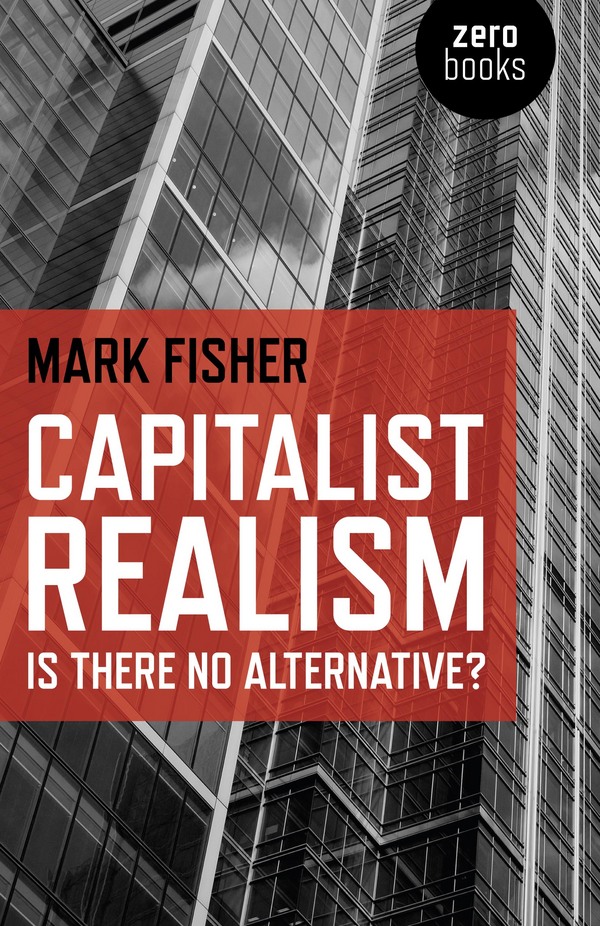August 16, 2009
Not available in all good bookshops...
A few people have written asking me when Capitalist Realism will be coming out: it will be published at the end of November, at the same time as the Michael Jackson book. But it won't be available in many bookshops when it's published (bookshops aren't exactly lithe and agile beasts, to say the least). It will be available online, of course (I'll link to the Amazon page as soon as it's up).
On the Michael Jackson book: a testament to how good the book will be is the fact that, after editing the essays, far from being jaded by MJ, I'm far more interested in him than I was beforehand. It's incredible how much strange and fascinating material was floating around, hidden in the songs - concealed partly because of Jackson's mangling of diction. Ian's and Reid's writing about "Thriller", to cite just only one example, has permanently transformed my experience of listening to the song... previously I'd heard it only as enjoyable enough kiddy fun(k), but Reid and Ian show that it is a kind of Lovecraftian-Zizekian incantation: Jackson thought that the horror references were an idle jape but "Thriller" ended up being a horribly accurate description of his subsumption into the "terror on the screen", his consumption by the "jaws of the alien", the Capital-Thing, from which there really was no escape....
demons closing in on every side... they're out to get you...
You feel the cold hand and wonder if you'll ever see the sun (As Ken Hollings reminds us in his excellent essay, Jackson once told a friend: "I can’t go out in the sun. My face would fall off.")
Break through in grey lair
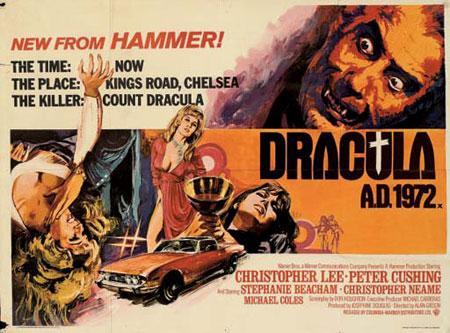
- Instead of tripping and beating a philosophy for its supposed faults only
to end up with the same range of mediocre biases with which we began,
we ought to find a more vigorous means of engagement with philosophers.
The method I propose is to replace the piously overvalued ‘critical thinking’
with a seldom-used hyperbolic thinking. For me at least, it is only books of the
most stunning weakness that draw attention to non sequiturs and other logical
fallacies. The books that stir us most are not those containing the fewest
errors, but those that throw most light on unknown portions of the map.
In the case of any author who interests us, we should not ask ‘where are the
mistakes here?’, as if we hoped for nothing more than to avoid being fooled.
We should ask instead: ‘what if this book, this thinker, were the most important
of the century? How would things need to change? And in what ways
would we feel both liberated and imprisoned?’ Such questions restore the
proper scale of evaluation for intellectual work: demoting the pushy careerist
sandbagger who remains within the bounds of the currently plausible and
prudent, and promoting the gambler who uncovers new worlds. Nietzsche makes far more ‘mistakes’ than an average peer-reviewed journal article,
but this does not stop intelligent adults from reading him all night long,
while tossing the article aside for a day that never comes. Graham, Prince Of Networks
This is one of the most stirring passages in Prince Of Networks, and it's particularly worth citing just now, when the topic of grey vampires has come up again. The mention of Nietzsche reminds me that he is one of the great scourges of grey vampirism, nowhere more than in the following passage from Part Six of Beyond Good And Evil:
- "Aren’t people’s ears all full enough already of wicked noises?” says the sceptic, as a friend of peace, almost as a sort of security police: “This subterranean No is terrifying! Be quiet at last, you pessimistic moles!” For the sceptic, this tender creature, is frightened all too easily. His conscience has been trained to twitch with every No, even with every hard, decisive Yes—to respond as if it had been bitten. Yes! And No!—that contradicts his morality. Conversely, he loves to celebrate his virtue with a noble abstinence, by saying with Montaigne, “What do I know?” Or with Socrates, “I know that I know nothing.” Or “Here I don’t trust myself. There is no door open to me here.” Or “Suppose the door was open, why go in right away?” Or “What use are all rash hypotheses? Not to make any hypotheses at all could easily be part of good taste. [...]" In this way a sceptic consoles himself, and he certainly needs some consolation. For scepticism is the spiritual expression of a certain multifaceted physiological condition which in everyday language is called weak nerves and infirmity.
Baron Mordant wrote to me a while back asking if grey vampirism wasn't a symptom of mental illness, and it is - but of the widespread, normalised and normalising pathology that Nietzsche describes here. As is wont, Nietzsche attributes the rise of the "spider scepticism" to racial intermixing but we needn't follow his ethnicising logic in order to utilise his analysis, which applies with uncanny acuity to the impasses of postmodern relativism and the stale corridors of the academy, tyrannised by the Fear - where the worst thing that could happen was that you are caught out in an error or a miscited quotation, rather than that you have wasted your life in endless equivocation, quibbling and deferral (while crying in your state-subsidised beer that you are doing so...)
Vampires do not appear in mirrors. In the case of grey vampires - and remember that there are vampires that are not grey; there are other kinds of energy piracy altogether, some more lustrous and ferocious - this means both that they cannot recognise themselves as vampires and that their existence is entirely dependent upon the attention of the Other. Grey vampires do not see themselves as vampires; they sincerely think that is a duty to deflate enthusiasm and puncture projects. One sure sign of a grey vampire is the airy dismissal of concepts such as energy vampirism - no matter what their theoretical commitments might be in their published intellectual work, GVs are resolutely commonsensical in their everyday ontologies. But make no mistake about it, there is no more Real level to human life than that of energy and its distribution. As Burroughs more than anyone else realised, persons and the social are just masks covering up a terrain populated by energy predators and propagators.
Remember that you have to invite a vampire over your threshold - and grey vampires, like trolls, lose all their power once you cease to pay them attention or think about them. That is why, when they feel that your attention is gone, GVs will try any trick to regain it - the appeal to 'democratic' values is a particularly scurrilous tactic ('you must give me your attention! It's your duty'). Trollls shamelessly try the same thing, of course, and it must be remembered that GVs are enablers of trolls - they like to position themselves as scrupulously neutral, uncommitted (whilst proferring all sorts of promissory notes about the commitments that they will make in future, what they will do once X or Y have stopped, the bad faith fantasies that prevent them from seeing the trap they are in) but the grey vampire's secret sympathies are always with the troll. For the troll actually articulates the resentment and spite which the grey vampires feel but are not able to express. They share the trolls' justification for their action - the belief that some people are getting ahead of themselves, that there is rather too much unseemly excitement about X or Y.... As if what was required in intellectual life is more bent heads, more bitterness, less enthusiasm.... Some teachers and lecturers do think that way, see it as their role duty to pass on the arid petrification which calcified their spirit usually sometime during their postgraduate career ... Remember: all vampires are victims of vampirism...
But I see motivating students, passing on enthusiasm, as the first and most important task of a teacher. (Which isn't to say that one has to blindly encourage everyting a student says or writes; far from it.) That's why I would say that one of the most despicable figures in the academic bestiary is the Troll-Master: the figure who feeds on the crushed enthusiasm of belittled students. The easiest way to win a cheap kind of respect is by adopting a nothing-can-impress-me hyper-critical stance, doused in cool weltweltschmerz, finding fault everywhere handing out praise and encouragement only very rarely; it's a transparent tactic, but one that works surprsingly well, and not only on jejune students, but also on very accomplished people, even those who have written a number of books. Often, the Troll-Master's own intellectual project will be mediocre and/ or suspended - it's clear that all their libidinal energy is tied up in enslaving students into neurotic servitude. Troll-Masters can permanently insinuate themselves into students' heads, but usually their power depends upon the hothouse claustrophobia of the university department - they are village despots, whose charismatic tyranny seldom works outside their own turf. If they have a long-term effect, it is only to produce more grey vampires.
Graham is absolutely right to note that grey vampires tend to operate on a one-to-one basis, whereas trolls always require an audience. That's because trolls want the attention of the big Other, whereas grey vampires want to directly identify with the big Other - to become the voice of neutrality and authority, the voice from nowhere, which doesn't make any refutable claims and therefore cannot be caught out. The reason that there is a close fit between grey vampirism and the academy - now more than ever - is that the academy seeks to inculcate precisely this kind of neurotic neutrality (the other side of careerist sandbaggery), where the most important thing is that footnotes are correctly formatted. It is usually liberating to actually read the work of GVs and Troll-Masters: from their endless, refined critique, you're led to believe that what they produce will be the most sophisticated, error-free, immaculate work you could imagine; it's quite a shock when you actually read it and see how contestable and (often) mediocre it is.
The alternative to these traps is not the heroic solitary genius, but the network, another reason that Graham's new book is so important. As Nick Srnicek has been arguing, political theory now has to deal with the question of networks. (Inidentally, one of the reasons that Speculative Realism can contribute so much to political theory is that the areas SR opens up do not come already pre-packed in supersaturated pseudo-political 'meaning', as in the exhuasted, dustbowl terrains presided over by trad continental philosophy.) The toxicity of grey vampires and trolls is so important to think about because they it is essentially network toxicity. Troll-jouissance is derived precisely from their capacity to corrupt networks - the troll's usual MO is enter a thriving network and destroy it by diverting all its energy to dealing with them. The grey vampire, as ever, is more subtle - and, for that reason and for so many others, more dangerous. They sap the network's energy, not only by defending trolls, but by also defending equivocation itself, by construing any decision or determinate position as oppressive (deconstruction is a grey vampire pathology). Their preferred model for discussion is the fruitless combat of the comments box/ discussion board 'debate'. This is the energy-swamp of web 2.0; but other kinds of network can grow here too.
August 15, 2009
Militant Dysphoria event
We have been told by the living that the idea of a vital world is that of comfort and warmth. Dominic Fox assures us that this is not the case. With an unparalleled militant efficiency, Cold World blackens the lines between poetics and politics, music and negative resistance. It is a haunting sermon from the world of the dead exhorting the living to revolt in the name of a life whose vitality has been disenchanted by coldness and whose sacredness has been profaned by nigredo. - Reza Negarestani, Author of Cyclonopedia: Complicity with Anonymous Materials
Dominic Fox's timely and important Cold World pinpoints the fundamental issue underlying contemporary debate about the possibility of revolutionary politics in a culture suffused by paralysing despondency. Drawing on a remarkable array of sources from Coleridge and Gerard Manley Hopkins to Xasthur and Ulrike Meinhof, Fox explores the necessary yet apparently contradictory link between refusal and revolution. While refusal without revolution perpetuates the very condition it would negate, revolution without refusal quickly lapses into phantasmatic utopianism. The quandaries of this particular dialectic have never been as lucidly charted as they are here. - Ray Brassier, Author of Nihil Unbound: Enlightenment and Extinction

Militant Dysphoria
Wednesday September 30th
Room RHB 256, Goldsmiths, University of London 2-6 PM
Featuring:
Dominic Fox
Nathan Brown
Mark Fisher
Nina Power
Nick Srnicek
James Trafford
Alex Williams
An event to discuss some of the issues raised by Domininc Fox's Cold World: The aesthetics of dejection and the politics of militant dysphoria, due to be published by zer0 at the end of September. What is meant by 'militant dysphoria', and in what ways can the concept help us move beyond the impasses of contemporary politics? How might disaffection be converted into militancy? What political potentials are there in dysphoric music such as Black Metal? The event will also explore the relationship between politics and Speculative Realism, touching on many of the issues raised by Nick in excellent interview.
This will not be a formal academic conference. Instead, it will follow the pattern set by the Weird events at Goldsmiths and the recent UEL symposium on the hardcore continuum. There will be short semi-formal presentations by speakers, but the emphasis will be on discussion of concepts rather than on presenting of papers etc.
The event is free but anyone interested in attending should register with me (k_punk99[AT]hotmail.com). Places are limited. In addition, if anyone would like to give a semi-formal presentation, please let me know.
August 08, 2009
Let's not beat around the bush: Fisher's compulsively readable book is simply the best diagnosis of our predicament that we have! Through examples from daily life and popular culture, but without sacrificing theoretical stringency, he provides a ruthless portrait of our ideological misery. Although the book is written from a radically Left perspective, Fisher offers no easy solutions. Capitalist Realism is a sobering call for patient theoretical and political work. It enables us to breathe freely in our sticky atmosphere.
- Slavoj Zizek
What happened to our future? Mark Fisher is a master cultural diagnostician, and in Capitalist Realism he surveys the symptoms of our current cultural malaise. We live in a world in which we have been told, again and again, that There Is No Alternative. The harsh demands of the 'just-in-time' marketplace have drained us of all hope and all belief. Living in an endless Eternal Now, we no longer seem able to imagine a future that might be different from the present. This book offers a brilliant analysis of the pervasive cynicism in which we seem to be mired, and even holds out the prospect of an antidote.
- Steven Shaviro
August 01, 2009
Eliminative naturalism
Dick-Disneyland-Dysphoria-Desertification
Dick's Time Out Of Joint, published in 1959, two years after the first Disneyland park opened, is remarkable for the way in which it treats literary realism as a kind of Disneyfication. In a classic moment of Dick ontological vertigo, the novel's painstakingly described small town is revealed, in the end, to be an intricate system of pasteboard frontages, hypnotic suggestions and negative hallucinations. The pay-off can just as easily be read in terms of critical metafiction as science fiction, for what is any setting in realist fiction if not the same kind of system? How is any 'reality effect' achieved except by authors using techniques such as these?
In the novel, the whole small town scenario is constructed as a pretext, a comfortable setting in which the protagonist can undertake high pressure military work for the goverment while thinking that he is doing a trivial newspaper contest. Yet it is clear that the science fictional elements were for Dick the pretext that allowed him to write successfully in a naturalistic way about 50s America. They were the enframing devices that enabled Time Out Of Joint to succeed where Dick's purely realist fiction failed.
In Postmodernism, Jameson captures the peculiar ache of nostalgia that Time Out Of Joint engenders, a nostalgia for the present, which Dick achieves by constellating stereotypical images of the decade he was writing at the end of: "President Eisenhower's stroke; Main Street, U.S.A.; Marilyn Monroe; a world of neighbours and PTAs; small retail stores (the produce trucked in from outside); favourite television programmes; mild flirtations with the housewife next door; game shows and contests; sputniks directly revolving overhead, mere blinking lights in the firmament, hard to distinguish from airliners or flying saucers." (Monroe actually features as one of the ontological anomalies that leads to the unravelling of the simulated small town, for she has not been incorporated into the reconstructed 1950s world, and appears to the main character only when he discovers some rotting magazines, relics of the real 50s, in wasteground "outside the city limits".)
What is remarkable is the way in which Dick was capable, in 1959, of already identifying those stereotypical features of the American 50s which would come to define the decade in retrospect. It is not Dick's skill in projecting into the future that is to be admired - the novel's 1997 is confected out of generic SF tropes, far less convincing than the ostensibly fake fifties world it embeds - but rather his capacity to imagine how the future would see the 50s. It is the 50s already envisaged as a themepark; an anticipated reconstruction. Dick's simulated smalltown is not enkitsched as Disney's memories of his early 20th century were, but precisely given what Jameson calls the "cabbage stink" of naturalism: "the misery of happiness, ... of Marcuse's false happpiness, the gratifications of the new car, the TV dinner and your favourite programme on the sofa - which are now themselves secretly a misery, an unhappiness that doesn't know its name, that has no way of telling itself apart from genuine satisfaction and fulfilment since it has presumably never encountered this last." In this lukewarm world, ambient dysphoria hides in plain view, a hazy malaise given off by the refrigerators, television sets and other consumer durables.
Jameson claims that "only Dick ... comes to mind as the virtual poet laureate of this material: of squabbling couples and marital dramas, of petit bourgeois shopkeepers, neighbourhoods, and afternoons in front of the television, and all the rest." Actually, Highsmith is another pulp poet laureate of the same impasses of 50s America, and Time Out Of Joint is very close to the cafes, suburban swimming pools and bitter marital deadlocks of This Sweet Sickness, Deep Water or The Blunderer. These naturalist impasses in Dick and Highsmith are invariably subsumed into a psychotic evacuation of the Symbolic. What initially seem to be merely slight deficiencies or excesses in the reality system inevitably turn out to be massive and irreperable cracks; and the pulp elements in Highsmith and Dick essentially amount to the authors' ultimate identification with the psychotic perspective, with the gaping void of the Real.
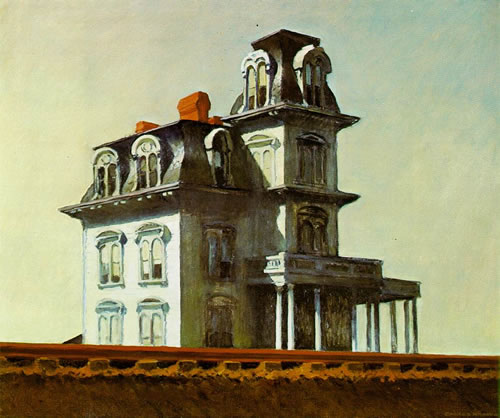
House on the borderland of Psychoville? Edward Hopper's House By The Railroad
Some of Dick's most powerful passages are those in which there is an ontological interrugnum: a traumatic unworlding is not yet given a narrative motivation; a unresolved space that awaits reincorporation into another Symbolic regime. In Time Out Of Joint, the interregnum takes the form of an extraordinary scene in which the seemingly dull objects of quotidian naturalism - the gas station and the motel - act almost like a negative version of the lamp-post at the edge of the Narnian forest. Unlike Lewis's lamp-post, these objects do not mark the threshold of a new world, a new Symbolic system; they constitute instead staging posts on the way towards the desert of the Real. When the edge of town gas stations come into focus, the background furniture of literary realism suddenly looms into the foreground, and there is a moment of Harmanian object-epipany, in which ready-to-hand, peripheral vision-familiarity transforms into uncanny opacity:
- The houses became fewer. The truck passed gas stations, tawdry cafes, ice cream stands and motels. The dreary parade of motels ... as if, Ragle thought, we had already gone a thousand miles and were just now entering a strange town. Nothing is so alien, so bleak and unfriendly, as the strip of gas stations - cut-rate gas stations - and motels at the edge of your own city. You fail to recognise it. And, at the same time, you have to grasp it to your bosom. Not just for one night, but for as long as you intend to live where you live.
But we don't intend to live here any more. We're leaving. For good.
It's a scene in which Edward Hopper seems to devolve into Beckett, as the natural(ist) landscape gives way to an emptied out monotony, a minimal, quasi-abstract space that is depeopled but still industrialized and commercialised. Beyond capitalist realism, the Real desert of Capital. "A last intersection, a minor road serving industries that had been zoned out of the city proper. The railroad tracks...he noticed an infinitely long freight train at rest. The suspended drums of chemicals on towers over factories." "Fields, rolling hills, everything featureless, with advertising signs stuck at intervals."
Here, in this no man's land at the edge of naturalist form, we are close to the process described by Alex: "the betrayal of every prior world, and desertification... but where the desert itself, the absolute plane… is absent, though the process… continues… the desert is a mirage, but the dust… the dust is real." An epigram perfect for Dick's eliminative naturalism, that: "the desert is a mirage, but the dust is real."
- Hollow outward form instead of substance; the sun not actually shining, the day not actually warm at all but cold, grey and quietly raining, raining, the god-awful ash filtering down on everything. No grass except charred stumps, broken off. Pools of contaminated water...
The skeleton of life, white brittle scarecrow support in the shape of a cross. Grinning. Space instead of eyes. The whole world ... can be seen through. I am on the inside looking out. Peeking through a crack and seeing - emptiness. Looking into its eyes.
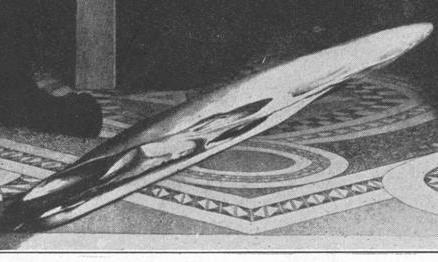
Next Friday at Tate Britain...
I've been invited by curator Hamja Ahsan to talk about londonunderlondon.... details below...
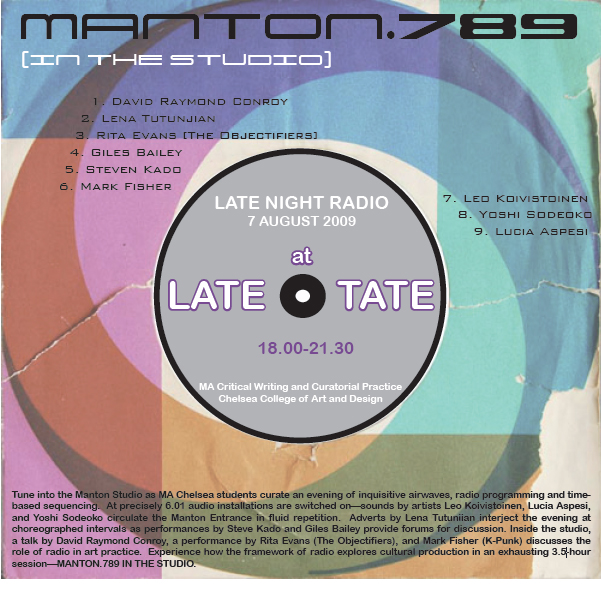
Other announcements:
Some people have enquired about the promised Eliminativism/Marxism post... it is on its way but I have a couple of big deadlines to meet first....
Finally, Capitalist Realism is to come out at the end of November... anyone who can help with promoting it, please drop me a line...
